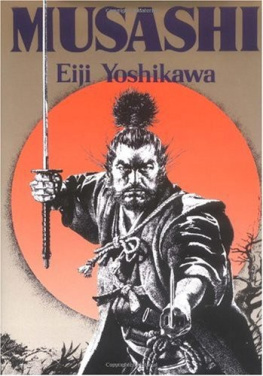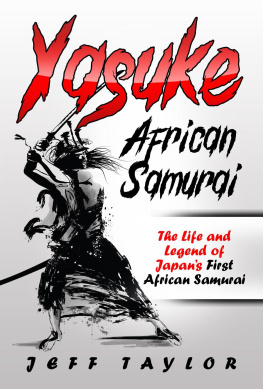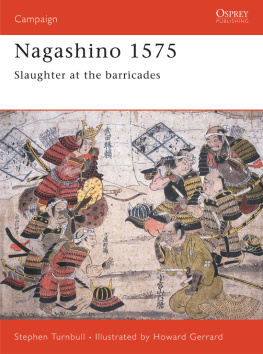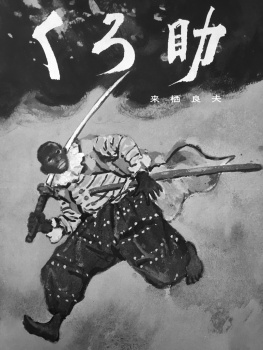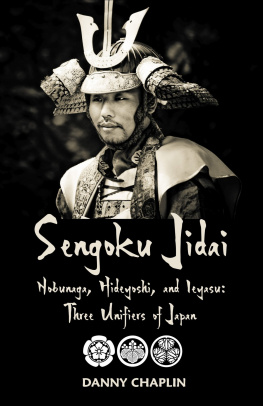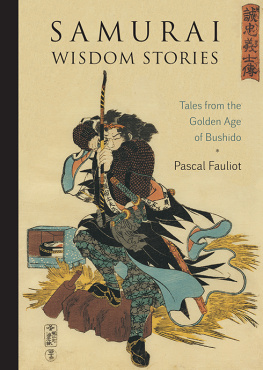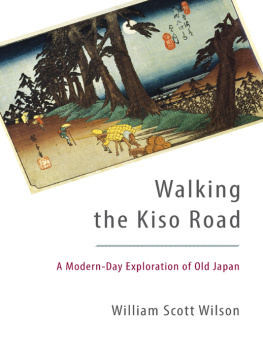TAIKO
AN EPIC NOVEL
OF WAR AND GLORY
IN FEUDAL JAPAN
Eiji Yoshikawa
Translated by William Scott Wilson
KODANSHA INTERNATIONAL Tokyo London New York
NOTE TO THE READER
Toward the middle of the sixteenth century, as the Ashikaga shogunate crumbled, Japan came to resemble one huge battlefield. Rival warlords vied for dominance, but from among them three great figures emerged, like meteors streaking against the night sky. These three men, alike in their passion to control and unify Japan, were strikingly different in personality: Nobunaga, rash, decisive, brutal; Hideyoshi, unassuming, subtle, complex; Ieyasu, calm, patient, calculating. Their divergent philosophies have long been recalled by the Japanese in a verse known to every schoolchild:
What if the bird will not sing?
Nobunaga answers, "Kill it!"
Hideyoshi answers, "Make it want to sing."
Ieyasu answers, "Wait."
This book, Taiko (the title by which Hideyoshi is still known in Japan), is the story of the man who made the bird want to sing.
1 FIFTH YEAR OF TEMMON 1536
CHARACTERS AND PLACES
HIYOSHI, childhood name of
Toyotomi Hideyoshi, the Taiko
OFUKU, adopted son of Sutejiro
ONAKA, Hiyoshi's mother
OTSUMI, Hiyoshi's sister
KINOSHITA YAEMON, Hiyoshi's father
CHIKUAMI, Hiyoshi's stepfather
KATO DANJO, Hiyoshi's uncle
WATANABE TENZO, leader of a band
of masterless samurai
SUTEJIRO, pottery merchant
HACHISUKA KOROKU, head of the Hachisuka clan
SAITO DOSAN, lord of Mino
SAITO YOSHITATSU, Dosan's son
AKECHI MITSUHIDE, retainer of the Saito clan
MATSUSHITA KAHEI, retainer of the Imagawa clan
ODA NOBUNAGA, lord of Owari
KINOSHITA TOKICHIRO, name given to
Hiyoshi when he became a samurai
SHIBATA KATSUIE, head of the Shibata clan
and senior Oda retainer
HAYASHI SADO, senior Oda retainer
OWARI, birthplace of Toyotomi Hideyoshi
and province of the Oda clan
KIYOSU, capital of Owari
MINO, province of the Saito clan
INABAYAMA, capital of Mino
SURUGA, province of the Imagawa clan
"Monkey! Monkey!"
"It's my bee!"
"It's mine!"
"Liar!"
Seven or eight young boys swept across the fields like a whirlwind, swinging sticks back and forth through the yellow mustard blossoms and pure-white radish flowers, looking for the bees with honey sacs, called Korean bees. Yaemon's son, Hiyoshi, was six years old, but his wrinkled face looked like a pickled plum. He was smaller than the other boys, but second to none among the village children when it came to pranks and wild behavior.
"Fool!" he yelled as he was knocked down by a bigger boy while fighting over a bee. Before he could get to his feet, another boy stepped on him. Hiyoshi tripped him.
"The bee belongs to the one who caught it! If you catch it, it's your bee!" he said, nimbly jumping up and snatching a bee out of the air. "Yow! This one's mine!"
Clutching the bee, Hiyoshi took another ten steps before opening his hand. Breaking off the head and the wings, he popped it into his mouth. The bee's stomach was a sac of sweet honey. To these children, who had never known the taste of sugar, it was a marvel that anything could taste so sweet. Squinting, Hiyoshi let the honey run down his throat and smacked his lips. The other children looked on, their mouths watering.
"Monkey!" shouted a large boy nicknamed Ni'o, the only one for whom Hiyoshi no match. Knowing this, the others joined in.
"Baboon!"
"Monkey!"
"Monkey, monkey, monkey!" they chorused. Even Ofuku, the smallest boy, joined in. He was said to be eight years old, but he was not much bigger than the six-year old Hiyoshi. Hewas much better looking, however; his complexion was fair, and his eyes and nose were nicely set in his face. As the child of a wealthy villager, Ofuku was the only one who wore a silk kimono. His real name was probably something like Fukutaro or Fukumatsu, but it had been shortened and prefaced with the letter o in imitation of a practice common among the sons of wealthy families.
"You had to say it too, didn't you!" Hiyoshi said, glaring at Ofuku. He did not care when the other boys called him monkey, but Ofuku was different. "Have you forgotten that I'm the one who always sticks up for you, you spineless jellyfish!"
Thus chastened, Ofuku could say nothing. He lost courage and bit his nails. Although he was only a child, being called an ingrate made him feel much worse than being called a spineless jellyfish. The others looked away, their attention shifting from honey bees to a cloud of yellow dust rising at the far end of the fields. "Look, an army!" cried one of the boys. "Samurai!" said another. "They've come back from battle." The children waved and cheered.
The lord of Owari, Oda Nobuhide, and his neighbor, Imagawa Yoshimoto, were bitter enemies, a situation that led to constant skirmishing along their common border. One year, Imagawa troops crossed the border, set fire to the villages, and trampled the crops. The Oda troops rushed out of the castles of Nagoya and Kiyosu and routed the enemy, cutting them down to the last man. When the following winter came, both food and shelter were lacking, but the people did not reproach their lord. If they starved, they starved; if they were cold, they were cold. In fact, contrary to Yoshimoto's expectations, their hardships only served to harden their hostility toward him.
The children had seen and heard about such things from the time they were born. When they saw their lord's troops, it was as if they were seeing themselves. It was in their blood, and nothing excited them more than the sight of men-at-arms.
Lets go see!
The boys headed toward the soldiers, breaking into a run, except for Ofuku and Hiyoshi, who were still glaring at one another. The weak-spirited Ofuku wanted to run with the others, but he was held by Hiyoshi's stare.
"I'm sorry." Ofuku nervously approached Hiyoshi's side and put his hand on his shoulder. "I'm sorry, all right?"
Hiyoshi flushed angrily and jerked away his shoulder, but seeing Ofuku on the brink tears, he softened. "It's just because you ganged up with the others and said bad things about me," he reproached him. "When they tease you, they always call you names, like : Chinese kid.' But have I ever made fun of you?"
"No."
"Even a Chinese kid, when he becomes a member of our gang, is one of us. That's what I always say, right?"
"Yeah." Ofuku rubbed his eyes. Mud dissolved in his tears, making little splotches around his eyes.
Dummy! It's because you cry that they call you 'the Chinese kid.' Come on, let's go the warriors. If we don't hurry, they'll be gone." Taking Ofuku by the hand, Hiyoshi ran after the others.
War-horses and banners loomed out of the dust. There were some twenty mounted samurai and two hundred foot soldiers. Trailing behind was a motley group of bearers: pike, spear, and bow carriers. Cutting across the Inaba Plain from the Atsuta Road, they began to climb the embankment of the Shonai River. The children outstripped the horses and scampered up the embankment. Eyes gleaming, Hiyoshi, Ofuku, Nio, and the other snotty-nosed kids picked roses and violets and other wildflowers and threw them in the air, all the time yelling at the top of their voices, "Hachiman! Hachiman!" invoking the god of war, and, "Victory for our valiant, glorious warriors!" Whether in the village or on the roads, the children were quick to yell this whenever they saw warriors.
The general, the mounted samurai, and the common soldiers dragging their feet were all silent, their strong faces set like masks. They did not warn the children about getting too close to the horses, nor did they favor them with so much as a grin. These troops seemed to be part of the army that had withdrawn from Mikawa, and it was clear that the battle had been bitterly fought. Both horses and men were exhausted. Blood-smeared wounded leaned heavily on the shoulders of their comrades. Dried blood glistene black as lacquer, on armor and spear shafts. Their sweaty faces were so caked with dust that only their eyes shone through.
Next page
